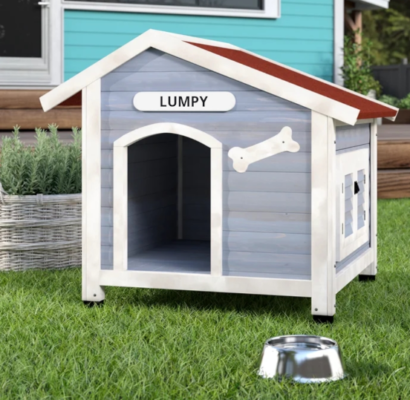Dogs with monkeypox, eye docs getting paid, who uses your health data, and more
17 Aug 2022
Posted by Andrew Kantor
Here come (more) OTC hearing aids
It’s been years (and years), but the FDA has finally approved a new category of over-the-counter hearing aids for people with mild to moderate hearing loss. Essentially they’re the audio version of non-prescription reading glasses.
These are not to be confused with non-prescription hearing aids that are already available — those are technically “personal sound amplification products” … although to be fair it’s hard to figure out where the line is.
Easy BP control
A simple way to help reduce blood pressure: Use a different kind of salt — potassium chloride instead of sodium chloride (e.g., Morton’s Salt Substitute, NuSalt (“Vegan”!), or MySalt).
A review by an international team of researchers confirmed that yes, everyone can lower their blood pressure by switching off sodium chloride. Or, if you want to sound smarter, “The beneficial effects of salt substitutes* on blood pressure across geographies and populations were consistent.”
(Back in April we reported how switching to KCl could cut the risk of strokes. This new study expands that to general health.)
* Here at Buzz, we don’t like the term “salt substitute.” It’s just a different *kind* of salt. Chicken is not a “meat substitute.”
Making the bandage stick
Putting a Band-Aid (or other brand of adhesive bandage) on wet skin is … well, pointless. It just slides off. But Canadian engineers have found a way to force them to stick: ultrasound. It seems the right frequency makes microbubbles in the adhesive, causing to to adhere to skin like a clingy five-year-old in Ikea.
Takeaway: Next time you spend a day at the beach, be sure to pack an ultrasound transducer in your first aid kit.
(Bonus: The technology may not be game-changing, but they do call it “paradigm-shifting.”)
Their dogs want CBD
Do you sell CBD products for pets? Maybe you should. Not that they necessarily do much, but because a new report expects “CBD pet products to see double-digit growth” through 2027.
As pet and animal products are focused on treats, supplements and food additives, therapeutic CBD with antianxiety and anti-inflammation properties is expected to remain the top-selling product.
Want the full report? You can get it here for just $4,750.
Captain Obvious prefers a letter
Researchers at the University of Alabama and Syracuse University, after conducting a two-year trial, have figured out that sending parents personalized text messages (rather than mass communications like TV commercials) works better at reminding them to get their kids a second flu shot.
The startling conclusion:
[I]f the recipient does not delete the message, [it] allows for them to come back to the information later at their time and convenience.
Cheap and easy
What does it cost to get eye docs to prescribe your brand-name drops over a generic? How about $65 a year? So say Johns Hopkins researchers who checked out the prescription and payment data.
[T]he researchers concluded that practitioners receiving any amount of pharmaceutical company payment were 1.8 times more likely than practitioners receiving no payments to prescribe branded eyedrops more than half of the time.
And, they say, this applies across the board — it’s not skewed by a few big subscribers, nor is it affected by location, age, or gender.
Monkeypox updates
Fido gets the floor
The headline kinda says it all: “Dog catches monkeypox from owners after sleeping in their bed.”

Name games
The WHO is planning to rename monkeypox to “avoid causing offense to any cultural, social, national, regional, professional, or ethnic groups.” They can’t specify who might find it offensive, because naming a particular group would imply a connection to monkeys … and that would be offensive*.
If you have an idea for a name, you can create an account and submit it here.
* Meanwhile, Legionnaires’ disease is still Legionnaire’s disease.
Here, have something to worry about
Think you don’t have to worry about monkeypox? A new CDC report found that “Monkeypox can persist in household environments” with viable virus samples persisting15 days after an infected person had left the home, especially on porous surfaces. (It’s not entirely surprising, they say; variola can remain viable for years in a cool, dry, dark environment.)
Sneaky info sharing
Health-related apps and websites — including those of hospitals — collect loads of personal info. Some of them, it seems use that information in ways that violate their promises … or even the law.
You might assume they share that data with some shady, bottom-feeding company that will use it for no good. And you’d be right; they’re sharing it with Facebook by using ad trackers that “followed the patients online and marketed to them based on those activities.”
And it’s not just smaller healthcare companies. Hospitals are doing it too by embedding a Facebook tracker in their websites.
Clicking the “Schedule Online Now” button for a doctor on the website of Froedtert Hospital, in Wisconsin, prompted the Meta Pixel to send Facebook the text of the button, the doctor’s name, and the condition we selected from a dropdown menu: “Alzheimer’s.”
Here at Buzz HQ, we use the Privacy Badger addon for our Web browsers, which keeps most of those trackers at bay, and uBlock Origin to avoid seeing those pesky ads at all. They’re both free.


